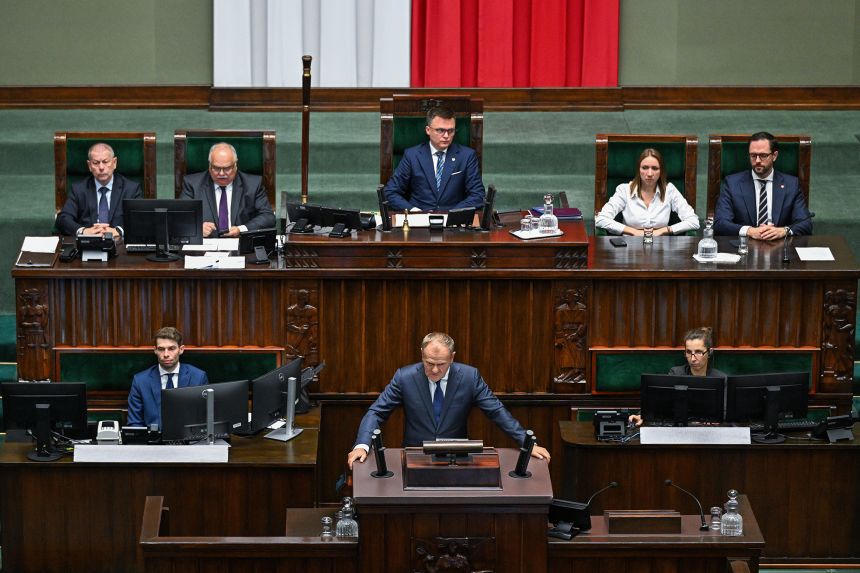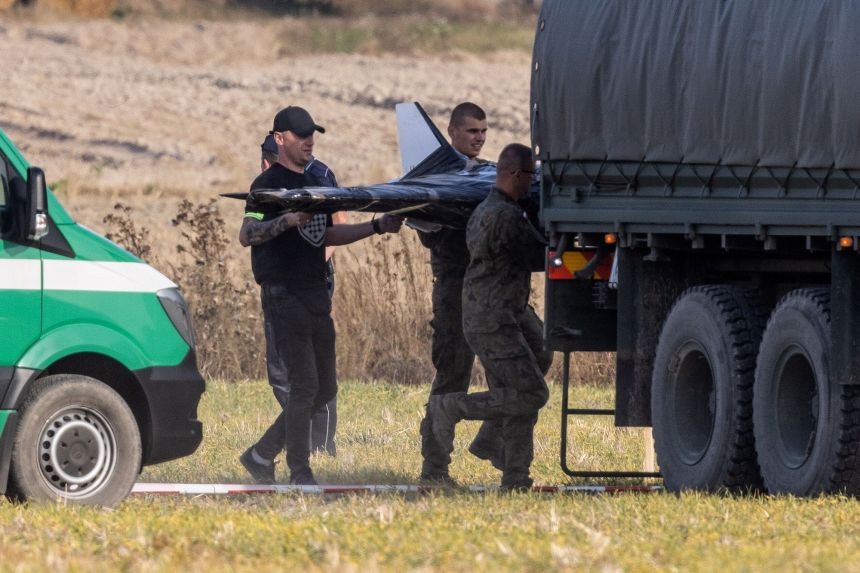Poland has triggered Article 4 of the North Atlantic Treaty Organization, NATO, after the country reported 19 “breaches” of its airspace by Russian drones on Wednesday.
NATO fighter jets shot down multiple Russian drones that violated Polish airspace during an attack on neighboring Ukraine, marking the first time that shots were fired by the alliance since the start of the war in Ukraine. A total of 16 drones were found scattered throughout the country, Poland’s interior ministry said later on Wednesday.
Now, NATO allies have formally discussed the situation, which Polish officials have called a “Russian provocation.” This is what you need to know about the invocation of Article 4:
What is NATO Article 4?
The transatlantic defense alliance employs the principle that an attack on one is an attack on all. Article 4 of its treaty states that any member country can formally bring an issue to the attention of NATO’s principal decision-making body, the North Atlantic Council, to meet and discuss next steps with allies.
The article says: “The Parties will consult together whenever, in the opinion of any of them, the territorial integrity, political independence or security of any of the Parties is threatened.”
It should not be confused with Article 5, the cornerstone of the alliance, which states an armed attack on one NATO ally will be considered an act of violence against all members and prompt assistance to the member concerned.
The discussion triggered by Article 4 could “potentially lead to some form of joint decision or action on behalf of the Alliance,” according to NATO. The consultation process is key because all alliance decisions are made by consensus.
The consultation that Poland called for took place Wednesday morning at a regular meeting of the North Atlantic Council in Brussels, Belgium.
What has Poland said about invoking Article 4?
Polish Prime Minister Donald Tusk announced the intrusions into his country’s airspace on Wednesday, noting that a “large proportion” of the drones entered from Belarus. He called the incident an “unprecedented violation” and confirmed that Poland had invoked NATO Article 4.
Other Polish officials have said that the sheer number of drones made it clear this was a deliberate act by Russia. Polish prosecutors said that at least some of the drones have been identified as Russian versions of the Iranian-designed Shahed, known as Gerbera.
Addressing Poland’s parliament on Wednesday, Tusk said that while there was no reason to say that the country was in a state of war, it was closer to a conflict than any time since World War II. He said Poland was facing an “enemy that does not hide its hostile intentions.”

Polish President Karol Nawrocki said Thursday: “The Russian provocation was nothing more than an attempt to test our capabilities and response. It was an attempt to check the mechanism of operation within NATO and our ability to react.” He added: “Thank you, because we passed all these tests.”
On Thursday, Poland’s Armed Forces announced a restriction on air traffic in the eastern part of the country through December 9.
The country has also said the UN Security Council will convene an emergency meeting to discuss the drone incursions.
Meanwhile, Russia’s defense ministry said in a statement that it had carried out a strike against Ukraine overnight into Wednesday. It said “no targets on the territory of Poland were planned for destruction,” and that the drones it uses in Ukraine have a flight range of no more than 700 kilometers (435 miles). Without providing evidence, Russia called the incident “myths repeatedly spread by Poland in order to escalate the Ukrainian crisis further.”
When has Article 4 been triggered in the past?
Article 4 has been triggered seven other times since NATO was formed in 1949.
Most recently, Poland, along with Bulgaria, the Czech Republic, Estonia, Latvia, Lithuania, Romania and Slovakia, requested to hold consultations in the immediate aftermath of Russia’s full-scale invasion of Ukraine in February 2022.
Poland previously invoked Article 4 in March 2014 “following increasing tensions in neighboring Ukraine, as a result of Russia’s aggressive actions,” according to the alliance. That move came after Russia’s illegal annexation of the Crimean Peninsula.
All of the other rare invocations of Article 4 were by Turkey, which asked for consultations related to threats coming from Iraq and Syria. Turkey last triggered Article 4 in July 2015, following terrorist attacks in the country.
Following the North Atlantic Council meeting on Wednesday, NATO Secretary General Mark Rutte said that “allies expressed solidarity with Poland and denounced Russia’s reckless behavior.”
“A full assessment of the incident is ongoing. What is clear is that the violation last night is not an isolated incident,” Rutte added.

On Thursday, NATO’s Supreme Allied Commander Europe, US General Alexus Grynkewich, said that it was not yet known if the drone incursion in Poland was an intentional or unintentional act, according to Reuters.
US President Donald Trump reacted to Wednesday’s air space incursion with a degree of bemusement. “What’s with Russia violating Poland’s airspace with drones?” Trump asked in a brief post on Truth Social. “Here we go!”
According to the US State Department, some 10,000 US troops are currently stationed in Poland.
CNN’s Antonia Mortensen, Ivana Kottasová and Nick Paton Walsh contributed to this report.